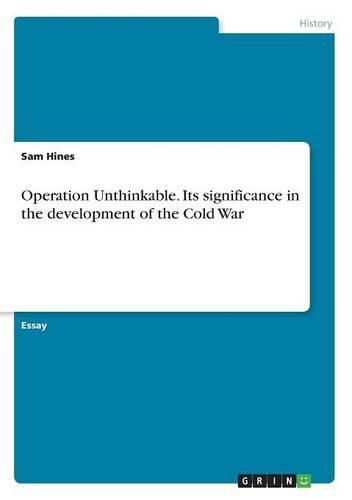Readings Newsletter
Become a Readings Member to make your shopping experience even easier.
Sign in or sign up for free!
You’re not far away from qualifying for FREE standard shipping within Australia
You’ve qualified for FREE standard shipping within Australia
The cart is loading…






Essay from the year 2016 in the subject History Europe - Other Countries - Europe in the Cold War, grade: A, language: English, abstract: This essay investigates the question How significant was Operation Unthinkable in the development of the Cold War? Operation Unthinkable was Churchill’s plan to attack the Soviet Union in 1945. Stalin was very suspicious of British actions and his intelligence soon discovered the document - although it is not clear when. This investigation makes use of a variety of primary and secondary sources. The first source is a book written by the historian Jonathan Walker: ‘Operation Unthinkable: The Third World War’ provides an in-depth study of the plan and considers its role in key events of the Cold War. Another source referenced is the document itself. Declassified in 1998, it is used to try to understand Churchill’s fears of the Soviet Union at the time. The rest of the investigation continues to use a range of interesting sources in order to understand the significance of the plan. The investigation is structured in the following manner: an introduction explains the historical and modern relevance of the topic followed by an analysis of key sources. From here, the essay investigates the significance of Operation Unthinkable by considering the tension it caused, the promises Stalin reneged on after Yalta, the USSR’s redeployment of troops, the introduction of the atomic bomb and the use of salami tactics. Also, the significance in terms of what it tells historians about Churchill’s views of the world is assessed. Finally, there is a conclusion to complete the essay.
$9.00 standard shipping within Australia
FREE standard shipping within Australia for orders over $100.00
Express & International shipping calculated at checkout
Essay from the year 2016 in the subject History Europe - Other Countries - Europe in the Cold War, grade: A, language: English, abstract: This essay investigates the question How significant was Operation Unthinkable in the development of the Cold War? Operation Unthinkable was Churchill’s plan to attack the Soviet Union in 1945. Stalin was very suspicious of British actions and his intelligence soon discovered the document - although it is not clear when. This investigation makes use of a variety of primary and secondary sources. The first source is a book written by the historian Jonathan Walker: ‘Operation Unthinkable: The Third World War’ provides an in-depth study of the plan and considers its role in key events of the Cold War. Another source referenced is the document itself. Declassified in 1998, it is used to try to understand Churchill’s fears of the Soviet Union at the time. The rest of the investigation continues to use a range of interesting sources in order to understand the significance of the plan. The investigation is structured in the following manner: an introduction explains the historical and modern relevance of the topic followed by an analysis of key sources. From here, the essay investigates the significance of Operation Unthinkable by considering the tension it caused, the promises Stalin reneged on after Yalta, the USSR’s redeployment of troops, the introduction of the atomic bomb and the use of salami tactics. Also, the significance in terms of what it tells historians about Churchill’s views of the world is assessed. Finally, there is a conclusion to complete the essay.